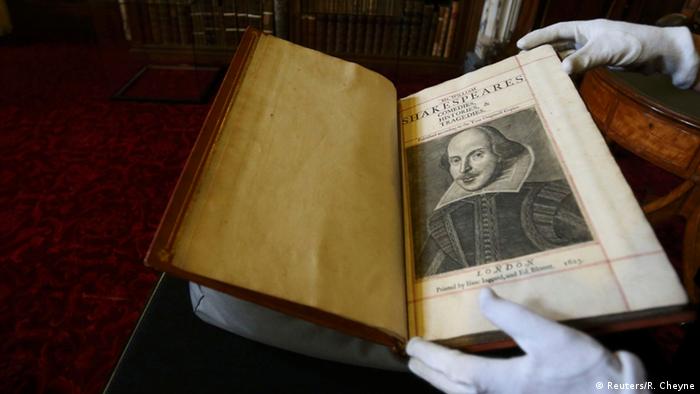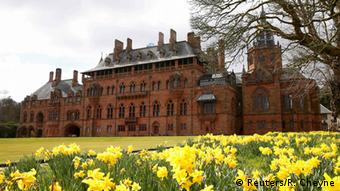You are using an out of date browser. It may not display this or other websites correctly.
You should upgrade or use an alternative browser.
You should upgrade or use an alternative browser.
Uncle Bill Shakespeare...Alive and Well!
- Thread starter Meanderer
- Start date
Meanderer
Seemly Member
'Astonishing' Shakespeare first edition found (2016)
"A very singular copy of the first known collection of Shakespeare's plays has been uncovered in an aristocratic country house in Scotland. The First Folio is among the most valuable books in the world".

"What is unique about this particular iteration, according to Oxford Professor Emma Smith, is that the First Folio has usually only been seen as one large volume. Instead, the Bute copy has been split into three, separated by categories of history, tragedy, and comedy."
"This is something that you could take to the fireside and enjoy," Smith told the BBC. "It's a book we most likely now see ... in a glass case, and one of the things that this copy ... shows us is a time when people just really used this book, they enjoyed it, they scribbled on it, they spilt their wine on it, their pet cats jumped on it."

The 300-year-old Gothic revival house is the ancestral home of the Stuarts of Bute, who first occupied the land some 900 years ago
"A very singular copy of the first known collection of Shakespeare's plays has been uncovered in an aristocratic country house in Scotland. The First Folio is among the most valuable books in the world".

"What is unique about this particular iteration, according to Oxford Professor Emma Smith, is that the First Folio has usually only been seen as one large volume. Instead, the Bute copy has been split into three, separated by categories of history, tragedy, and comedy."
"This is something that you could take to the fireside and enjoy," Smith told the BBC. "It's a book we most likely now see ... in a glass case, and one of the things that this copy ... shows us is a time when people just really used this book, they enjoyed it, they scribbled on it, they spilt their wine on it, their pet cats jumped on it."

The 300-year-old Gothic revival house is the ancestral home of the Stuarts of Bute, who first occupied the land some 900 years ago
Gaer
"Angel whisperer"
- Location
- New Mexico U.S.A.
Meanderer: Thank you for starting this post! I can't get enough of Shakespeare!
Meanderer
Seemly Member
"Sonnet 73, one of the most famous of William Shakespeare 's 154 sonnets, focuses on the theme of old age. The sonnet addresses the Fair Youth. Each of the three quatrains contains a metaphor: Autumn, the passing of a day, and the dying out of a fire. Each metaphor proposes a way the young man may see the poet".


Tish
SF VIP
- Location
- Rural N.S.W. Australia
Meanderer
Seemly Member
What Shakespeare Teaches Us About Living With Pandemics (LINK)
"Plague erased social, gender and personal differences. Shakespeare responded by emphasizing people’s unique and inerasable difference. His work is a narrative vaccine".
By Emma Smith
Ms. Smith is the author of “This is Shakespeare.”
Shakespeare’s King Lear berates his daughter Regan as “a plague-sore or embossed carbuncle / In my corrupted blood.”

Credit...Cassell and Company, Limited,
1899/Print Collector, via Getty Images
OXFORD, England — Twitter has been taunting us: When he was in quarantine from the plague, William Shakespeare wrote “King Lear.”
He had an advantage, of sorts: Shakespeare’s life was marked by plague. Just weeks after his baptism at Holy Trinity Church in Stratford-upon-Avon in 1564, the register read, “Hic incepit pestis” (Here begins the plague). Mortality rates in the town were four times that of the previous, plague-free year. Shakespeare, the son of the town’s glover, survived it and many further outbreaks. Much of his work was composed, if not in lockdown, then in the shadow of a highly infectious disease without a known cure. (Continue)
"Plague erased social, gender and personal differences. Shakespeare responded by emphasizing people’s unique and inerasable difference. His work is a narrative vaccine".
By Emma Smith
Ms. Smith is the author of “This is Shakespeare.”
Shakespeare’s King Lear berates his daughter Regan as “a plague-sore or embossed carbuncle / In my corrupted blood.”

Credit...Cassell and Company, Limited,
1899/Print Collector, via Getty Images
OXFORD, England — Twitter has been taunting us: When he was in quarantine from the plague, William Shakespeare wrote “King Lear.”
He had an advantage, of sorts: Shakespeare’s life was marked by plague. Just weeks after his baptism at Holy Trinity Church in Stratford-upon-Avon in 1564, the register read, “Hic incepit pestis” (Here begins the plague). Mortality rates in the town were four times that of the previous, plague-free year. Shakespeare, the son of the town’s glover, survived it and many further outbreaks. Much of his work was composed, if not in lockdown, then in the shadow of a highly infectious disease without a known cure. (Continue)
Meanderer
Seemly Member

Shakespeare and the four humors (LINK)

William Shakespeare. Courtesy Folger Shakespeare Library.
"William Shakespeare (1564–1616) created characters that are among the richest and most humanly recognizable in all of literature. Yet Shakespeare understood human personality in the terms available to his age—that of the now-discarded theory of the four bodily humors—blood, bile, melancholy, and phlegm. These four humors were thought to define peoples‘ physical and mental health, and determined their personalities, as well". (Continue)





















